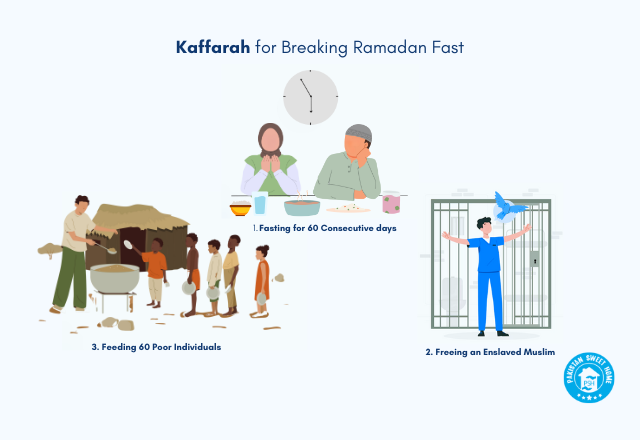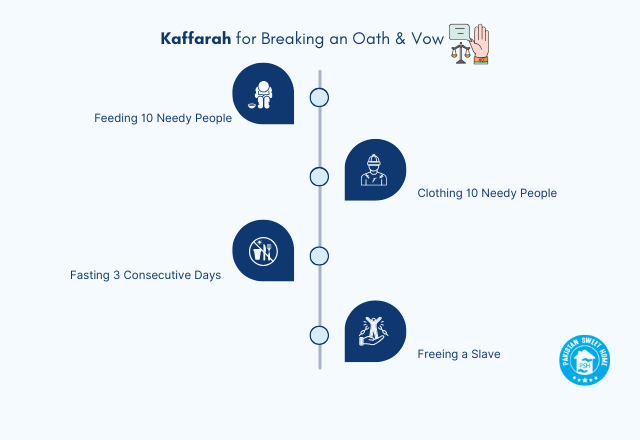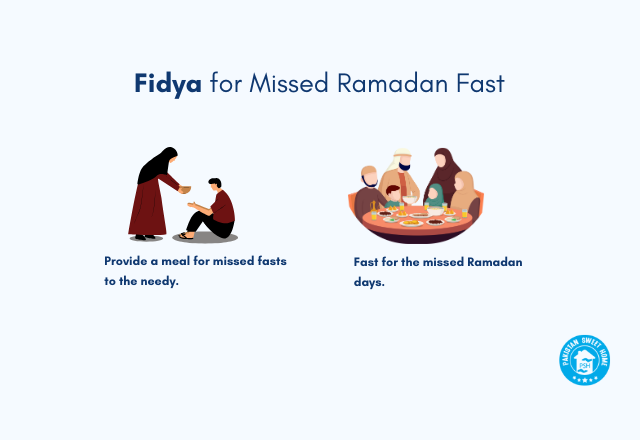Many Muslims are unsure of what to do after intentionally breaking their fast during Ramadan.
This is not a minor mistake—it requires a serious response grounded in Islamic law and repentance. Ignoring kaffarah for breaking fast can leave you spiritually uneasy and distant from Allah’s mercy.
Without guidance, you may overlook an obligation that holds great weight in the eyes of Allah. Confusion around fasting rules, penalties, and fulfillment of kaffarah creates anxiety for many believers.
Let’s explore what kaffarah is for breaking the Ramadan fast, its requirements, formula, and ways to fulfill it.
What Is Kaffarah for Breaking a Ramadan Fast?
Kaffarah refers to the expiation or penalty prescribed for intentionally violating a day of fasting in Ramadan. The obligation to perform kaffarah follows a strict hierarchy of three prescribed actions.
One must perform the first act unless it's genuinely impossible. The options cannot be freely chosen. Only in such cases can the person move to the next form of atonement.
The three prescribed forms of kaffarah are as follows:
1. Freeing an Enslaved Muslim
The first and foremost form of kaffarah involves freeing an enslaved Muslim. Modern readers may view slavery as outdated, but human trafficking still exists in some areas today.
For those who cannot fulfill this obligation due to unavailability or financial constraints, the next option becomes applicable.
2. Fasting for Two Consecutive Lunar Months
If freeing an enslaved person is impossible, the individual must fast for two consecutive Islamic months. This requires uninterrupted fasting; breaking the fast at any point necessitates starting over. This rigorous act emphasizes discipline and a deep accountability for the violation.
3. Feeding 60 Poor Individuals
When neither of the above options is feasible, the person must feed 60 poor individuals. This act of charity underscores the importance of aiding those in need while expressing remorse for breaking the fast. Each person must be provided with a full, nutritious meal.
How to Fulfill Kaffarah by Feeding 60 Poor People?
If freeing a slave or fasting for two months is impossible, feed 60 needy people. This must be done for each intentionally violated Ramadan fasting day. This religious obligation can be fulfilled in various ways, as long as the total equals 60 meals a day missed.
For example, one may:
- Provide one needy person with 60 meals.
- Feed 10 people six times each.
- Use any other combination that totals 60 meals for each missed day.
It is also permissible to delegate the kaffarah obligation to a charitable organization that will distribute meals to 60 people on behalf of the person.
Alternatively, the individual can distribute 60 sa‘ of food, a traditional measure equal to four double handfuls of grain per sa‘. This translates to 287.8 pounds (130.56 kg) of staple foods such as rice, wheat, or dried fruits, which can be stored without refrigeration.
Formula for Kaffarah Payment in PKR
To feed the poor for kaffarah, the cost is approximately PKR 3,000 per person per day. Assuming an exchange rate of USD 1 = PKR 300, this applies to 60 people.
The calculation for kaffarah would therefore be:
PKR 180,000 x Days Missed = Total Kaffarah Payment
This amount reflects the cost of providing full meals to 60 needy individuals for each fasting day missed.
When Is Kaffarah Required?
The requirement for kaffarah depends on the specific circumstances under which the fast was broken.
1. Breaking the Fast with Intercourse
Scholars agree that sexual activity during fasting hours requires kaffarah. This is due to the deliberate nature of the act. This is considered one of the most serious violations of the sanctity of fasting.
The obligation of kaffarah depends on why and how the fast was broken. Scholars agree on some cases and differ on others.
A hadith narrated by Abu Huraira provides profound insight into the spirit of kaffarah:
A man approached the Prophet (PBUH) saying,
"I am doomed! I had relations with my wife during fasting in Ramadan."The Prophet asked if he could free a slave, fast for two months, or feed 60 poor people.
Unable to do any of these, the man received a basket of dates to feed his family. This act showcased the Prophet’s compassion and understanding."
(Sahih al-Bukhari: 6711)
This story shows the balance between Kaffarah’s strict laws and Prophet Muhammad’s (PBUH) mercy.
2. Breaking the Fast Without Intercourse
The obligation of kaffarah to break the fast without sexual activity varies among scholars. Some argue that kaffarah is unnecessary in certain cases. However, making up the missed fast day and seeking sincere repentance is essential.
What Happens if You Break Your Ramadan Fast on Purpose?
Breaking a fast during Ramadan is serious in Islam. It shows disrespect for the holy month. Whether it involves eating, drinking, or engaging in sexual activity, such actions require the individual to:
- Make up for the missed fast day.
- Seek forgiveness from Allah.
- Reflect on their actions and renew their commitment to fasting.
For violations involving sexual intercourse, kaffarah is obligatory. In cases of other deliberate violations, scholarly opinions differ, but repentance and resolution to uphold future fasts are universally emphasized.
What About Menstruating Women Fasting Consecutive Months?
For menstruating women, consecutive fasting days exclude the days of menstruation. The continuity of her fast remains intact as she resumes fasting from the day after her menses ends.
This cycle continues until she completes 58 to 60 fasting days, depending on the length of the lunar months. Interruptions due to menstruation do not invalidate her consecutive fast.
Special Cases: Menstruation After Intercourse
If a woman claims her husband forced her into intercourse during Ramadan, she’s exempt from kaffarah. If she didn’t participate willingly, no kaffarah is required. If a fasting woman engages in intercourse and menstruates afterward, she must still fulfill kaffarah.
In conclusion, understanding the obligations of kaffarah for breaking fast of Ramadan is essential for all Muslims. From the required acts of atonement to the prophetic guidance on fulfilling this penalty, it is clear that kaffarah is a serious responsibility.
Fulfilling kaffarah Ramadan through fasting, feeding the poor, or other means shows sincere repentance. It reflects a commitment to upholding Ramadan's sanctity. By following the proper steps and formula, you can effectively fulfill your kaffarah and seek forgiveness for any violations.
As we reflect on the importance of Kaffarah, supporting a cause like orphanage donation can be a meaningful way to fulfill our charitable duties. Your contributions to Pakistan Sweet Home ensure that orphaned children receive the care and support they deserve, making a lasting impact on their lives.
Fulfill Kaffarah by Feeding Orphans

info@pakistansweethome.org.pk
(051) 4865856
+92 335 1118477








